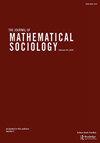投票权与腐败循环
IF 1.3
4区 社会学
Q3 MATHEMATICS, INTERDISCIPLINARY APPLICATIONS
引用次数: 4
摘要
本文引入了一个民主国家腐败的演化动力学模型,描述了公民、政府和官员之间的相互作用,其中公民的投票权是控制腐败的主要机制。腐败演变的三种主要情况取决于机构的效率以及国家的社会、政治和经济特征。有效的制度可以创造出一种不容忍腐败的自我强化机制。政治选择的缺乏、制度的薄弱和贿选会形成一种自我强化的腐败机制。统治者的野心可能导致高度腐败,而腐败可以通过公民的投票权来对抗,从而形成腐败循环。本文章由计算机程序翻译,如有差异,请以英文原文为准。
The power of voting and corruption cycles
ABSTRACT We introduce an evolutionary dynamical model for corruption in a democratic state describing the interactions between citizens, government and officials, where the voting power of the citizens is the main mechanism to control corruption. Three main scenarios for the evolution of corruption emerge depending on the efficiency of the institutions and the social, political, and economic characteristics of the State. Efficient institutions can create a corruption intolerant self-reinforcing mechanism. The lack of political choices, weaknesses of institutions and vote buying can create a self-reinforcing mechanism of corruption. The ambition of the rulers can induce high levels of corruption that can be fought by the voting power of the citizens creating corruption cycles.
求助全文
通过发布文献求助,成功后即可免费获取论文全文。
去求助
来源期刊

Journal of Mathematical Sociology
数学-数学跨学科应用
CiteScore
2.90
自引率
10.00%
发文量
5
审稿时长
>12 weeks
期刊介绍:
The goal of the Journal of Mathematical Sociology is to publish models and mathematical techniques that would likely be useful to professional sociologists. The Journal also welcomes papers of mutual interest to social scientists and other social and behavioral scientists, as well as papers by non-social scientists that may encourage fruitful connections between sociology and other disciplines. Reviews of new or developing areas of mathematics and mathematical modeling that may have significant applications in sociology will also be considered.
The Journal of Mathematical Sociology is published in association with the International Network for Social Network Analysis, the Japanese Association for Mathematical Sociology, the Mathematical Sociology Section of the American Sociological Association, and the Methodology Section of the American Sociological Association.
 求助内容:
求助内容: 应助结果提醒方式:
应助结果提醒方式:


